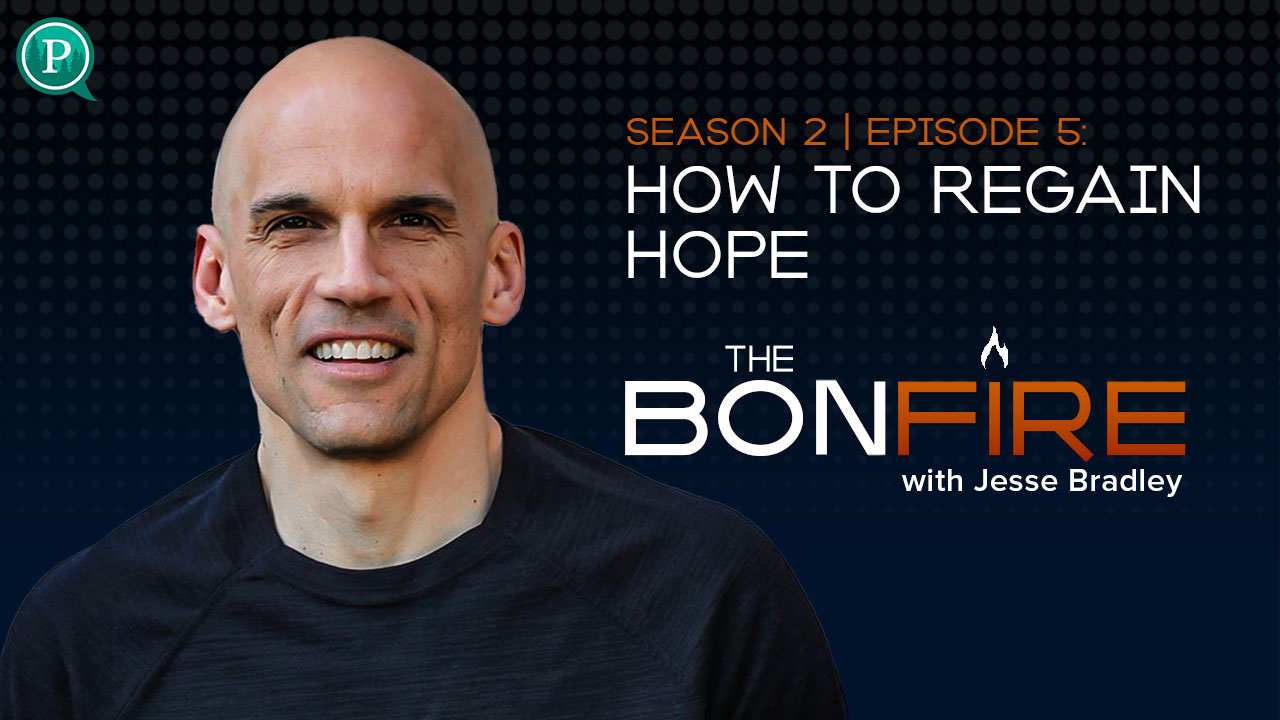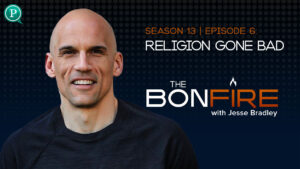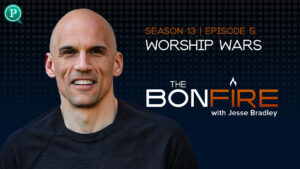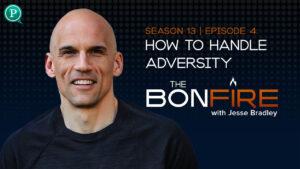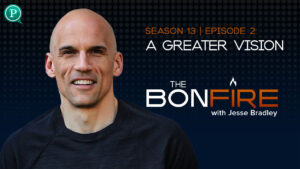Hope is a joyful and confident hope in something or someone. Where are you placing your hope? Let’s take a look at the four elements and expressions of hope. The good news is there is a hope that never runs out that is available for you! Grab hold of it today.
If this resonates with you, please rate, review, and subscribe where you listen to podcasts. For updates follow me @jessejbradley on all socials and for the latest videos check out my YouTube channel Jesse Bradley. The best is yet to come!
Show Notes:
Who is available, relational, habitual, and indestructible. Hope it’s a confident and joyful trust in someone or some thing. There are four elements and expressions of hope: yoir mind, your heart, your mouth , and your hands. With your mind, be intentional. The power of the second thought. Philippians 4:8 Psalm 119:9–11 Goalkeeper mode in between your ears, saying no to hope thieves
With your heart, be humble. Not too big, not too small. Humility is required to receive hope. Peter, how to self-sufficient pride, and then a shame pride. He learned how to let Jesus lead. God wants to fill our heart with Hope. Romans, 15:13
With your mouth, bring affirmation. Receive affirmation from God. Gideon’s example. Judges 6:12 God’s affirmation is throughout the Bible. It’s the most important information. We also need to receive and give affirmation. Parents can operate out of a strength approach or a deficit approach
With your hands, serve generously. Zacchaeus was selfish and stingy, but God changed him to be kind and compassionate. You can serve if you have gifts as a handyman or in communication with other people or listening to other people. Great listeners, who understand, and care are a gift.
The fullness of hope is in word, outward, and upward. It involves our minds hearts, mouth, and hands. God is the source of hope. He doesn’t run out.
Special thanks to World Concern for sponsoring The Bonfire Podcast.
Transcription:
Purposely. Your life, God’s purpose. Listen at onpurposely.com.
Welcome to The Bonfire. It’s great to be together again. Thank you for all of the notes, the emails, the comments. I really feel like we’re building up a connection, we’re growing in our faith. And this podcast is all about God’s presence. That’s why we’re here today. We want to grow together, and as we dive into scripture, talk about topics that sometimes we don’t really get honest with people, we don’t go deep. Today, it’s hope.
And hope is one of those that you might not recognize when you lose some hope, or you might not tell anyone. You might not know how to regain hope, how to find hope. I didn’t find hope until I lost it. And it was at the lowest point in my life that I realized I need to learn, I need to be intentional about hope because when it’s not there, it slows everything down. You end up in a ditch and you feel like there’s no path forward.
Losing hope is a serious deal. And across America statistics tell us as the Census Bureau saying half the country feels hopeless, or the American Psychological Association saying that we’re more stressed than ever. There’s more deaths by drug overdose. There’s a lot of statistics, but more importantly, those represent people. And this podcast is all about people. It’s all about change lives, getting real, going deep, talking about some subjects and having a place where we can really think through stuff.
As we talk about hope today, hope is a confident and joyful trust in someone or something. And I like to say hope is available for everyone. Hope is relational, hope is also habitual. There are habits we can cultivate. And there’s an indestructible hope that’s greater than our challenges, and that’s what changed my life. And so I have a lot of passion on this topic today.
I want to look at it in terms of a full view of hope, not a partial view or just a glimpse, but more of a holistic. And it might not be exhaustive, but I want to hit four key areas, and that’s the mind, also the heart. Those two are connected, not compartmentalized. And then there’s our mouth, the words we speak, and serving, our hands. Let’s think through those four together. And as we do this, think about your own dashboard right now. In terms of hope, similar to when you’re in the car, you look at the dashboard, how much gas is in the car? How much oil? What’s the temperature? Well, it’s good to check in terms of hope, how are you doing?
For most people these days, they’ve lost more hope than they wanted to, and they’re just trying to figure out how to regain it. And when I didn’t have it, I didn’t have habits, I didn’t have a way to cope, I didn’t have a roadmap. I didn’t know where to go. I was in survival mode. And that’s necessary at some points in our life, but there’s also an intentionality that we can cultivate daily habits. And I want us to think through that today.
We’re going to start with the mind. And I just wrote a book, The Power of the Second Thought. You can check that out on Amazon. And it’s a book that’s very practical, it shares my journey. And ultimately it’s a book that includes inward, outward, and upward hope. We need all three. And when you consider the mind, I think of the Apostle Paul and he wrote something in Philippians chapter four, verse eight, “Whatever is true, noble, right, pure, lovely, admirable. If anything is excellent or praiseworthy, think about such things.” In other words, be intentional with your thoughts.
Psychologists tell us that we have thousands of thoughts every day, and the National Science Foundation reports that up to 80% are not helpful. What are you doing with all of those unhelpful thoughts? There’s a verse in the Bible that says, “Take every thought captive, make it obedient to Christ.” And it’s been said before, “Either you take your thoughts captive or your thoughts are going to take you captive.” And you have a responsibility, a role, to guide your thinking during the day. When those first thoughts come in like a flood, you don’t have to believe, harbor, or entertain that first thought. In fact, God encourages you and empowers you to choose what you’re going to focus on. Because whatever you focus on in life, starts to grow. If you focus on your problems, your problems get bigger. You focus on God, your view of God grows, your faith grows. You choose what you focus on. No one can make you focus on anything during the day.
Yes, there’s advertisements and we have hundreds of them. Yes, there’s a noisy culture and yes, a lot of first images and first thoughts come to mind. But you don’t have to dwell on those. You get to choose, what do you want to think about during the day? And your thoughts set a trajectory for your day, your life, your destiny, your legacy. All that’s connected to your thinking.
Not many people talk about your thoughts and how to manage them, guide them, steward them. When I was in school, all the way through school, there wasn’t any practical teaching. And even beyond that, I didn’t have anyone to show me. So, the Bible’s really the place where I started to dive deep, and there’s a renewing of the mind. The Bible says, “God renews our minds.” We need that. Sometimes garbage in, garbage out. Sometimes there’s a lot to sort through and filter through in our culture today.
But when we are focused on the right things, there’s going to be fruit in every area of our life. Our mind, it’s connected to our attitude, our responses, and our relationships. And healthy thinking, it’s an overflow that leads to so many other healthy dynamics in our life. When our thinking is not right, we can end up in despair, worry, fear. We can end up in some places that are kind of dark, lonely places. We can end up in some places that we don’t want to be. And that’s what I say, the ditch.
In my thinking, when I was at my lowest point, my mind would end up in the ditch. And I would start to believe these lies like my life’s not going to get better. There’s no hope for me. I don’t have a backup career. I don’t have a lot of friends. How am I going to make friends when things in my life aren’t going well? I had all these thoughts flooding in and those are a lot to overcome.
Now, I was a professional soccer goalkeeper. I was paid to keep the ball out of the back of the net. And in goalkeeper mode, you’ve got to be aware, you got to be thinking, the whole team is positioned. Because everything depends on keeping the ball out of the back of the net. When my career ended tragically and I was fighting for my life for a year, during that time, I was still in goalkeeper mode, except I learned how to do it in between my ears, my mind. Because all these first thoughts were coming at me like a shot in soccer. And I didn’t want them to hit the back of the net. I didn’t want them to be lodged into my mind, my heart, my soul. And I needed to figure out, how am I going to approach it when there’s all these thoughts I don’t want?
And this is, in a nutshell, the power of the second thought, you’ve got to first recognize your thoughts during the day. If you don’t think about what you’re thinking, you’re just going to think whatever you’re thinking. So you need to stop and recognize, what are the first thoughts that are coming in? And which ones are true, which ones are right, which ones are good? And be able to discern the difference. Which ones are from God? Once you become aware, you recognize the thought, then second, you choose to reject the thoughts, reject the thoughts that are destructive, reject them. And then the third, you’re going to replace them intentionally, with a clear second thought. You’re ready with that second thought, and you go there. This is a habit that I cultivate every single day.
When Jesus was tempted, he quoted scripture. He had a second thought ready, he had scripture ready. There’s no better second thought than scripture. And he would say, “It is written.” It’s great if you have a couple Bible verses. And memorization, meditation, they are underutilized, underappreciated, undervalued. Those habits, memorizing, meditating on scripture, that renews the mind. And when you meditate on scripture, memorize scripture, you’ve got a second thought that’s ready, that’s solid. And Jesus will make your house like a house on the rock, not the sand. That kind of reaction is what I was learning to do, recognize, reject, and then replace.
There are some other verses in the Bible. How can a young man or woman keep your way pure, your mind pure, your body pure, by living according to the word. “I seek you with all my heart. Do not let me stray from your commands. I have hidden your word in my heart that I may not sin against you.” That’s Psalm 119, verses nine through 11. Hide God’s word in your heart. Put God’s word in your mind. And God’s word dwelling in you, it’s going to be a help when you’re tempted.
We’re all tempted every day. That’s not a sin. But how we handle those temptations, that gets back to our thinking. What’s our approach? Do we just simply try hard, try better feel guilty, feel shame? That’s not the plan from Jesus. There’s no condemnation for those who are in Christ. God removes sin in our lives, the power of sin. He gives us a way out. He removes shame and guilt. And then he renews our minds so that we see sin how he sees it, and that he gives us power to say no, and to follow him with a way out of sin. No sin should master you, and no secret sin needs to be a pattern in your life. No destructive patterns of thinking need to continue. Those are broken in Jesus’ name.
And as you think about these thoughts that come in, and they’re like an attack. I call them hope thieves. When you have thoughts that are coming in your mind, not from God, they literally want to steal your hope. They want to tell you that there’s no future for you, things aren’t going to get better. You’ve made too many mistakes, you’ve blown it too many times, you have too many flaws, and all these different things. It goes against the Bible. The Bible says, “God is with you, God loves you, God has a plan, God has a purpose. You can trust God.”
And your perspective can switch, because you don’t want the perspective of the world and the culture and the patterns of the world. You don’t want the perspective of your own flesh and your own false thinking. Instead, you want God’s perspective. When you have God’s perspective, that leads to God’s peace. And with the second thought, the scripture that God brings, there is power in the word of God, there’s power in scripture. And as your mind is filled up with the word of God, the powerful second thought, you’re going to experience new victories, you’re going to experience new breakthroughs. This renewing of the mind.
I’m taking a little extra time on this one because this is really a key with hope. And it’s something that I don’t think a lot of people are practicing or talking about or aware of it. And it’s a development, a cultivation of a new habit. And God wants to do a new work.
Listen, the real estate between your ears is too valuable. Just like you wouldn’t let a thief in your home, you don’t want hope thieves coming in and residing, getting comfortable. And you don’t want to embrace them. Instead, you say, “Not in my house, get out of here. You’re not welcome. You don’t belong here.” The enemy comes to steal, kill, and destroy. Jesus comes to give abundant life. And that abundant life is connected to our thinking. And this is practical, this is daily.
Let me say this, in terms of a habit, there are four stages. And I can put it in terms of soccer. Before I was a goalkeeper, I had no idea that you catch the ball with a W. See, the first stage is you don’t even know the habit exists. You don’t even know the skill exists. And then the second part, the second part is that I was taught, catch the ball with a W. And a shot would come in, it’s coming fast. I would catch the ball and I’d look how I caught it, doesn’t even look like a W. Couldn’t do it. I understood the concept, just wasn’t there yet.
And then what would happen is I’d focus on W. All right, my mind, “W, W, W.” I’m really thinking about the W. And the ball comes and I catch it with the W, but I’m trying so hard to focus on a W, it’s a little stiff. And then the fourth stage, it becomes natural. Now I’m catching the ball, I’m diving to the corners. It’s a W. I’m not even thinking about W. Those four stages, if you want a technical term for those four stages, it starts with unconscious incompetence. You don’t know what you don’t know. Then there’s conscious incompetence. You’re really trying and focusing, but it’s just not working yet. And the third stage is conscious competence, meaning you’re starting to get it, but again, you really need to put in lots of effort. It’s not natural. And that fourth stage, unconscious competence. You just know how to do it. If I said tie your shoe, you wouldn’t even think about it now. It’s an unconscious competence. That’s the progression with habits, with skills. It’s true with the power of the second thought.
I say that to emphasize that you need to be persistent, consistent, and just keep going. It takes a little time, takes some practice. There’s going to be some days where you’re like, “Wait a second, my thinking was a mess today. I was so off track, I was down all day. I was just dwelling. I was replaying the old tapes of my mistakes, and it was just killing me on the inside.” And then there’s going to be other days where you’re like, “I recognized it early, saw for what it is, and then switched. Made the shift, started to have some intentional second thoughts.”
Here’s a couple of intentional second thoughts that help me. So, “Do not fear, do not be dismayed. I am your God, I am with you. And I will help you and strengthen you with my righteous right hand.” Isaiah 41:10, “Perfect love drives out fear.” That’s one verse that I go back to all the time. “No temptation can overcome you, but God is faithful to give away out.” Those are examples of verses. But when you have those second thoughts ready, you’re going to win the battle of the mind.
And I think the Apostle Paul wanted us to see that as we say yes to God, it’s going to include some things that God is going to do in our minds in some new patterns, some new responses. And it’s going to be refreshing, it’s powerful. And that’s where God’s presence is, is to protect and guard our minds. And we need that, need that daily.
For generations, children and families in the poorest places in the world have struggled to find clean water, food, and a chance for a brighter future. But all that can change in this generation. You can be part of the solution. Go to worldconcern.org. As you participate, this is what will happen. Villages will be transformed far beyond where the road ends, and children and families will receive the love of Christ. You can make a difference. Go to worldconcern.org. Let’s be part of the solution together.
The second, it’s with our hearts. And I want to emphasize here to be humble. And in terms of humility, I think of Peter. Peter was out fishing all night, professional fishermen. They didn’t catch anything. Jesus came along and they were just like, “Jesus, you don’t know anything about fish.” Jesus said, “Drop the nets down over there.” They’re like, “We’ve been fishing all night, haven’t caught anything, but since you say so, Jesus, we’ll drop them.” And they hauled in so many fish.
And you know what Peter felt like? He just felt like, “Who am I? I’m such a sinner. I’ve blown it so much.” And it was a humility that he started to approach Jesus with. And this would play out in many different scenarios. When Jesus was washing feet, Peter said, “Don’t wash my feet.” That’s a form of pride. When you don’t want to receive from Jesus and you don’t want to receive hope from Jesus, it’s a form of pride. “I’m good. I’m self-sufficient. I’ve made it this far on my own. I don’t need you. I don’t want you to do that. It’s too much for you. Don’t want to burden you.” All that is pride and it’s lies. And instead, humility receives, humility receives hope. And with your heart, you’re going to need to receive. Take down those walls that you’ve got built up. And the other form of pride is he said, “Okay, then wash my whole body.” No, Jesus is going to wash his feet, not his whole body.
And that’s how it is with receiving. Sometimes we say, “No, I don’t need you at all, God.” And then other times we say, “Well God, if I say yes to you, then do it this way and this way and this way and this way and this way.” It just doesn’t work like that. Humility comes before God and receives. And I talk to a lot of people that their worth and identity is based on their performance and they haven’t shifted. They haven’t shifted and received God’s grace. They see God’s grace as like something nice, God’s hope, something nice on the outside, just a little dabble of it. Not too much.
No, this is an immersion from the inside out. It’s an overflow. It’s immense. To receive his grace, his forgiveness, his peace, his hope, you got to learn how to receive. You can’t give what you don’t receive. You can’t share what you don’t have. You start a relationship with Jesus through receiving. His forgiveness of sins. He died for your sins and he’s risen. You receive that. It’s grace, an undeserved gift.
You start every day, you receive God’s word, God’s encouragement, God’s love, God’s presence. If you just dive into the day, you might feel worn out and beat up, but you start by receiving. You start to run low in different areas, you go back to receiving, abiding, receiving with Jesus.
You have a source greater than you. You have a source that doesn’t run out. God doesn’t distribute hope with some small rations. He doesn’t look in the storehouse and say, “You know, we’re running low on hope only have a little bit for you today. Here, try to just take this and get through the day.” That’s not how God works. For those who come to God humbly ready to receive, you’re going to receive an immense amount from God. And it’s going to be sufficient for today. His grace is sufficient. His hope is sufficient.
The mind and the heart, they go together. Some people want to love God with their minds, but they don’t open up their hearts. They’ve got all the answers, they pass the Bible quiz, but they don’t really have hope flowing in their hearts. Other people, they talk about hope, but it’s not really hope from God, it’s kind of wayward. It’s kind of weird hope. It’s based on people or circumstances. And it’s like, “No, it is good intentions, but in terms of your mind, the thoughts aren’t right.” It’s got to be full of truth and mind and heart. And let’s keep going because there’s a third one. It’s the mouth and the words you speak.
Here’s a contrast, it’s important with hope. Some people, and especially parents, they take a deficit approach and others take a strength approach. A deficit approach is when your words tear people down. You overemphasize their mistakes, their flaws. You have a critical spirit. And without realizing it, you kind of judge people. It’s a deficit approach when parents are telling their kids, “Well, you’ve blown that, this accident. Clearly you messed up this. You’re not very smart. Here’s your flaws. You’re not as good as other people.” Some parents say that kind of stuff, usually out of frustration. And it’s destructive for kids. It’s the opposite of hope. It steals hope. It’s another hope thief.
But instead, the affirmations, the strengths, “You’re made in God’s image. You’re loved. You’re not alone. What do you need? I’m here for you.” All those statements, “You’re gifted, you’re talented, you’re doing a great job. I love your effort.”, those are important. And those affirmations come from other people and those affirmations come from God. God’s hope. When Jesus is baptized, the Father says, “This is my son whom I love and whom I’m well pleased.” You need to receive that, that God loves you. He’s pleased with you.
Zephaniah chapter three says that God sings over us. And those kinds of affirmations from God, they’re throughout the Bible. There’s hundreds of affirmations about who you are in Christ, that you are secure, you are forgiven. You are God’s daughter and son. You belong to God’s family forever. No one can separate you from the love of Christ. All these affirmations, God writes them down so we will receive them. And God speaks to people at the right time with the right words.
Gideon was called to deliver the people because there were cruel attacks happening, the Midianites were coming and they would ravage. And Gideon was called by God. Sometimes God will call you, your name’s on it. Yet you’re insecure, you’re fearful. God said to Gideon, “I am with you. You are a mighty warrior.” He gave him an affirmation going into battle that, “I’m with you. You’re a mighty warrior. We’re going to rescue some people together.” And Gideon pushed back and said, “No, no, you don’t understand me. The Midians are so strong. All the damage they’ve done. And you know what? My family is so weak. I’m the weakest in my clan, in my family.” He’s thinking, “You got the wrong Gideon. You sent the text to the wrong Gideon, God. You got confused. There’s other Gideons in the camp. This is not me. I’ll forward the email to somebody else, God, on that calling.” You ever feel like that? And Gideon has to shift and receive God’s affirmation so he has hope, so he sees himself how God sees him.
A lot of people have self-hate, don’t have hope. It’s hard to have self-hate and hope at the same time. But when you realize how God sees you and you have an accurate view of yourself, not too big, not too small, now you’re walking secure. Now you’ve got that hope. And when you start to see other people and love other people like God loves them, and your heart starts to break for what God’s heart breaks for. When you tackle injustice and you meet needs and you build up people and their souls and you see their lives change, healing, restoration, that’s exciting. That’s the hope. Receive the affirmation because when you receive affirmation from God, you’re going to start giving affirmation for other people.
Maybe even stingy with affirmation. Maybe you don’t really build other people up. You think, “Well, they already know. I’m not really a talker. I don’t need to say anything.” It’s time for you to start saying some things. “I love you. I appreciate you. I’m thankful for you. I’m grateful for what you did. You are gifted. You did an excellent job with that.” Let those statements just start to flow. “It’s good to see you.” Affirm other people with your words. Your words are powerful. The ripple effect is massive, far beyond what you can see. And when you make statements, that hope travels. Hope is designed to travel, and we’re all designed to receive and give hope.
If you only receive hope, you’re just hoarding it. It’s kind of a selfishness. But you receive it and you give it. If you’re giving hope all the time and you’re serving and you’re always doing things for other people and you don’t receive any hope, it’s admirable and noble in one sense, but also you’re going to get burned out. You’re going to get tired out, because you’re just not receiving. You’re always in give mode, and we need to do both. And so, I’m highlighting both for you today, receiving hope and giving hope. Our mind, our hearts, our mouth, that’s the words.
And then finally I’ll include our hands. And this is the serving. If you’re in a low place right now, find someone to serve. It could be that you’ve drifted into a little bit of a cocoon, a little bit of an echo chamber. Maybe you’re kind of in a cave and there’s not much connection, there’s not much serving going on, there’s not much generosity. Generosity is contagious. Generosity and hope traveled together.
There’s a man named Zacchaeus who was stingy and selfish. And in the Gospel of Luke, he climbed a tree because he had all this money, took advantage of people, ripped people off, had a huge bank account. Not really many friends. Didn’t have anything going on in terms of a relationship with God. And he saw Jesus and he sensed hope. The closer you get to Jesus, the more hope that you’re going to experience in sense.
Jesus changes hearts. The laws of the land don’t change hearts. And when Jesus spent time with Zacchaeus, even though he had been taking advantage of other people, he repented. And repent means to shift 180 degrees. You might have some barriers in your life right now. You might have some sin patterns that basically your hope is running out. Hope can leak. And when there’s sin, hope leaks. And for Zacchaeus, hope had been leaking out for a long time because of the patterns in his life. And selfishness undermines and destroys hope.
But Zacchaeus, his heart was changed and Jesus does that. Zacchaeus started to give money away. He said, “I’m going to give money back to everyone that I’ve taken advantage of. And I’m going to start to give money to the poor.” And you see where his hands went? They went from, “Give me, give me, give me more. I’m going to steal more, I’m going to take more. I’m going to take advantage. I want more money for me.”, to instead, “Freely, I’ve received, freely, I’m going to give. I want to help. I want to provide. I want to make a difference. I want to give you resources.” And He’s giving and giving and giving. They’re shocked. They’re stunned. Is this the same Zacchaeus? Well, it’s the same man, but from the inside out, it’s not the same man.
Have you ever felt that, like when God does a work in your life and he starts to change you? You might have a gift where you roll up your sleeves and you build stuff. You’re a handyman, you can fix things. Do you know how many people would love to have someone come help them in their apartment, their house, their condominium? That skill, you’re going to bring a lot of hope to people. Or maybe for you it’s talking and it’s communication. Maybe for you it’s listening. You’re a little more of an introvert and you’re one of the best listeners. And when you listen to people, people feel so valued and cherished. You know how hard it is to find someone who listens with real care and empathy, who makes time to listen, who emotionally enters in? That’s a rare gift. And when you do that well, people are just going to feel… they’re going to come alive again. They’re going to feel connection. They’re not alone. Someone’s there. The ministry of presence that you’re there.
So many ways to serve people. And as you serve people, you’re going to come alive because selfishness never brings hope, but serving does. And when you serve, you’re going to make a bigger difference than you realize. There’s going to be a ripple effect, more lives touched. And how do you enter into that? You simply say, “God, I offer myself to you.” If you haven’t done that or you don’t do that during the day, that’s not a habit. Make that a new habit. “God, today is yours. Today’s a gift. I’m thankful for it. God, I know you go ahead of me. There’s all kinds of opportunities. I want to be faithful today. I ask for your help, your strength today, God. And I offer myself to you. God, where do you want me to serve? Who do you want me to serve today?”
This great joy, it’s when you connect with people, serve people. You make this place better, you make your workplace better. You see people’s lives change. You see healing. Man, that’s energizing. That’s what it’s all about. And that’s the hope that God brings.
There’s a verse in the Bible, Romans 15:13, “The God of all hope. He will give you joy and peace as you trust in him.” Trust God, more hope. Stop trusting God, less hope. When you trust God, you’re going to have joy and peace. And then hope will be overflowing through the power of the Holy Spirit. You’re not designed to manufacture or fake hope or just muster up hope. This hope is relational through a relationship with the Holy Spirit. And when you put your trust in Jesus, the Holy Spirit is in you. And the Holy Spirit wants to do what you cannot do. And the Holy Spirit is going to bring comfort and power, love, hope. It’s a gift. All these things are a gift. And the Holy Spirit, he is going to do amazing things in your life.
So, draw near to God today. And to review and thinking about hope, there’s an inward, outward, and upward hope. We’ve covered a lot, so you can check out the book, The Power of the Second Thought, powerthought.org. And a lot of these topics that I’ve covered today, there’s a deep dive in that book. And when you consider hope, hope is holistic. It includes our minds, our hearts, our mouth, and our hands. It includes what we’re thinking, includes our feelings. It includes also the way we serve people and use our gifts and the words we say.
And ultimately, God brings hope into our soul. And when your soul is on fire and it’s full of hope, the hope is not just going to stay with you. It can’t be contained. It’s too good, it’s too big. You’re going to want to share it with other people, and they’re going to come alive too. Hope is contagious. Hope is a confident and joyful trust in someone or something. Your hope is only as strong as the one in whom you trust, so put your hope in Jesus, an anchor for the soul.
And if you don’t know the Lord, make a decision today to follow Jesus. And if you do know the Lord, then say yes to God. Say yes to God that you would receive his hope, give His hope daily, lavishly, generously. And God’s going to do amazing things in you, through you, and beyond you.
Thanks so much for listening today. Share this episode with a friend. Let’s encourage each other. Let’s grow in our faith, let’s grow in our hope. And that happens when we draw near to God, because there’s no greater gift than his presence.
Follow this podcast:

